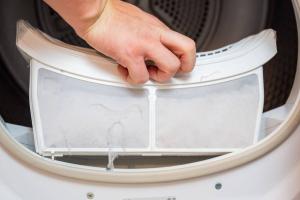How to Effectively Troubleshoot a Dryer That Smells Like It's Burning

-
Quick Links:
- Introduction
- Common Causes of a Burning Smell
- Safety First: Precautions to Take
- Step-by-Step Troubleshooting Guide
- When to Call a Professional
- Preventive Measures for Your Dryer
- Case Studies
- Expert Insights
- FAQs
Introduction
Experiencing a burning smell from your dryer can be alarming and may indicate a serious problem. Ignoring this issue can lead to further damage or even pose a fire hazard. In this comprehensive guide, we will explore how to troubleshoot a dryer that smells like it is burning, ensuring you can address the problem safely and effectively.
Common Causes of a Burning Smell
Understanding the potential causes of a burning smell can help you pinpoint the issue more quickly. Here are some common culprits:
- Lint Buildup: Lint can accumulate in the dryer vent and exhaust system, leading to overheating and burning smells.
- Overheating Components: Electrical components, such as the motor or heating element, can overheat, producing a burning smell.
- Foreign Objects: Items like coins or metal objects can get stuck in the dryer drum, causing damage and odors.
- Worn Belts: A worn or frayed drive belt may generate a burning rubber smell as it slips.
- Faulty Wiring: Damaged or exposed wiring can lead to electrical shorts, producing a burning odor.
Safety First: Precautions to Take
Before troubleshooting your dryer, it’s crucial to prioritize safety. Here are several precautions to consider:
- Unplug the dryer to prevent any electrical hazards.
- Ensure the area around the dryer is well-ventilated.
- Keep flammable materials away from the dryer.
- If you notice smoke, evacuate the area and call emergency services.
Step-by-Step Troubleshooting Guide
Follow these steps to troubleshoot your dryer effectively:
Step 1: Unplug the Dryer
Start by disconnecting the power to prevent any electrical hazards.
Step 2: Inspect the Lint Trap
Remove and clean the lint trap. A clogged lint trap can cause overheating.
Step 3: Check the Venting System
Inspect the dryer vent and exhaust duct for lint buildup. Use a vacuum or a vent cleaning brush to clear blockages.
Step 4: Examine the Interior
Look for any foreign objects in the drum or venting system that may be causing the smell. Remove any items you find.
Step 5: Inspect the Drive Belt
Open the dryer cabinet and check the drive belt for wear. Replace if frayed or damaged.
Step 6: Look for Signs of Overheating
Check for discolored or burnt components, especially around the heating element and motor.
Step 7: Check Electrical Connections
Inspect wiring and connections for any signs of wear or damage. If you notice any issues, consult a professional.
Step 8: Reassemble and Test
After performing the above checks, reassemble the dryer, plug it in, and run a test cycle to see if the smell persists.
When to Call a Professional
If you’ve gone through the above steps and the burning smell continues, or if you are uncomfortable performing any of these checks, it’s time to call a professional technician. They can diagnose and fix complex issues that may be beyond your expertise.
Preventive Measures for Your Dryer
To ensure your dryer operates safely and efficiently, consider these preventive measures:
- Clean the lint filter after every load.
- Schedule regular maintenance checks for your dryer.
- Inspect and clean the venting system at least once a year.
- Ensure that your dryer is properly installed to prevent overheating.
Case Studies
Here are a couple of real-world examples illustrating dryer issues:
Case Study 1: Lint Buildup
A family reported a burning smell coming from their dryer after several months of heavy use. Upon inspection, they discovered the vent was clogged with lint, which they cleaned thoroughly. After addressing the issue, the burning smell disappeared.
Case Study 2: Worn Drive Belt
A homeowner experienced a burning rubber smell. They found the drive belt was worn and replaced it, which resolved the smell and improved the dryer’s performance.
Expert Insights
Experts recommend regular maintenance and being proactive about dryer care. According to the U.S. Fire Administration, failure to clean dryer vents is a leading cause of dryer fires. Keeping your dryer clean and well-maintained is essential for both safety and efficiency.
FAQs
1. What should I do if my dryer smells like it’s burning?
Unplug the dryer immediately, inspect the lint trap and venting system, and check for foreign objects or damaged components.
2. Can a dryer catch fire?
Yes, a dryer can catch fire, often due to lint buildup or electrical issues. Regular maintenance can help prevent this.
3. How often should I clean my dryer vent?
You should clean your dryer vent at least once a year, or more frequently if you use your dryer often.
4. What are the signs of a faulty heating element?
Signs include insufficient heat, burning smells, or the dryer not starting. If you suspect an issue, consult a professional.
5. Is it safe to use a dryer that smells like burning?
No, it’s not safe. You should stop using it immediately and troubleshoot the issue to prevent hazards.
6. How can I prevent my dryer from smelling like burning?
Regularly clean the lint trap, inspect the vent, and schedule maintenance to prevent burning smells.
7. Should I call a technician for a burning smell?
If basic troubleshooting doesn’t solve the problem, it’s best to call a technician for safety.
8. What tools do I need for dryer troubleshooting?
A screwdriver, a vacuum, and a lint brush are typically sufficient for basic dryer inspections.
9. Can I clean the dryer vent myself?
Yes, you can clean the dryer vent yourself, but for thorough cleaning, consider hiring a professional.
10. How can I tell if my dryer is overheating?
Signs include a burning smell, clothes taking longer to dry, or the dryer being excessively hot to the touch.
Random Reads